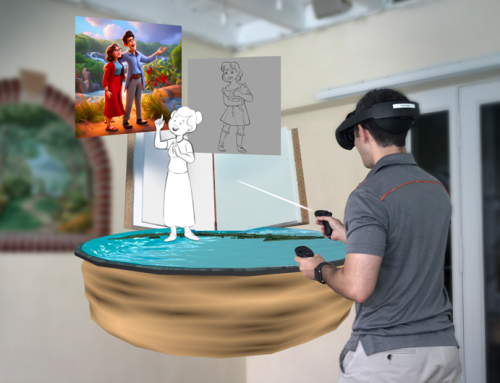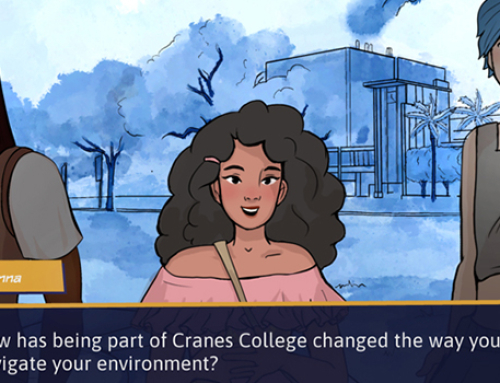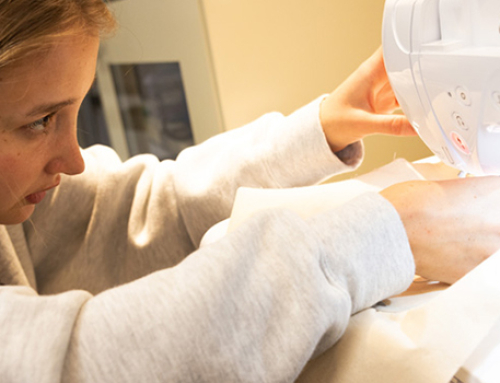By Barbara Gutierrez
Lindsay Grace, an associate professor at the School of Communication, and a team of fellow academics have developed an AI-generated tip sheet that can help news organizations by scouring information and providing leads to pursue.
For many journalists, the idea of sharing space with artificial intelligence is threatening. As it is, the news business is in a steep decline, with U.S. newsroom employment down 26 percent since 2008, according to the Pew Research Center.
A combination of factors has contributed to this decline but new technologies are also fueling the decrease. The rise of the internet and social media are at the top of the list.
Lindsay Grace, the Knight Chair for Interactive Media and an associate professor at the University of Miami School of Communication, believes that technology and specifically artificial intelligence can help today’s journalists, especially at a time in which they are facing dwindling resources.
“I think we should look at the AI industry like we look at the internet,” he said. “It is a way of extending a journalist’s reach and efficacy in the work they are carrying out.”
Just as looking at various websites can facilitate research on the web, AI can enhance the reporting process, said Grace.
Grace and a team of scholars from several universities published a paper called “Exploring Reporter-Desired Features for an AI-Generated Legislative News Tip Sheet” that appeared in the April 2022 research journal of the International Symposium of Online Journalism. The John S. and James L. Knight Foundation funded their project.
The team developed a tip sheet that, powered by AI, can help news organizations by scouring information generated from state legislature meetings. The system gleans interesting news nuggets and provides background data on the events to help the reporters in their newsgathering.
The system generates “recipe cards” with news information gathered from a wide set of websites that provide context and perspective that would be time consuming for a reporter to do on their own, said Grace.
“We recognize that it is extremely expensive to keep a journalist listening in on every event at the state level,” he said. “Instead, we have these AI systems as kind of sensors to do this work for them.”
So far, the team has set up systems for states that have Sunshine Laws and therefore provide open access to state legislatures and meetings. These are California, Florida, Texas, and New York.
Grace believes that the future of journalism is for journalists to work hand-in-hand with computer scientists to come up with ideas to enhance and facilitate their work.
To begin their research, Grace and his team sent surveys to 10,000 professionals in the news industry and received 193 responses. While 98 percent said it would be important to cover the policies and decisions unfolding in state legislatures, only 37 percent said they had the resources to do so.
“We want to fill in that gap,” said Grace.
The system is helpful in many ways, said Grace. It not only highlights state legislature members’ actions that could be newsworthy but provides full transcripts and even videos of the meetings.
“So, if the AI system is telling a reporter that there was tension between two participants, the reporter can go back and view the conversation,” said Grace. The AI can also aggregate data and numbers that would take a reporter hours to gather.
“For example, it would take a while to do the math whether someone is voting contrary to their usual voting pattern,” said Grace. “What we do is simply aggregate that person’s voting history, and we give the journalists those statistics.”
But can AI go beyond that and actually generate stories for newspapers and other news outlets?
Grace said that a few news outlets are using AI to generate basic stories, mostly accounts of sports scores, real estate transactions, or weather stories.
“Some of these stories are of the most mundane activities, such as how did the high school baseball team do last night,” he said. “These are easy to process, and numbers are plugged into a template.”
In the future, Grace and his team hope to develop algorithms that will allow AI to do the groundwork type of reporting in journalism needed to create more complex narratives.
But humans should not fear AI. “The algorithm is only as good as the human that inputs the information,” Grace pointed out.
Other academic members of the team who worked on the project were: Patrick Howe, associate chair and associate professor of journalism at California Polytechnic State University; Foaad Khosmood, Forbes professor of Computer Engineering at California Polytechnic State University; and Christina Robertson, executive director of the San Luis Coastal Educational Foundation.
This article originally appeared at https://news.miami.edu/stories/2022/07/can-artificial-intelligence-help-journalists.html.






